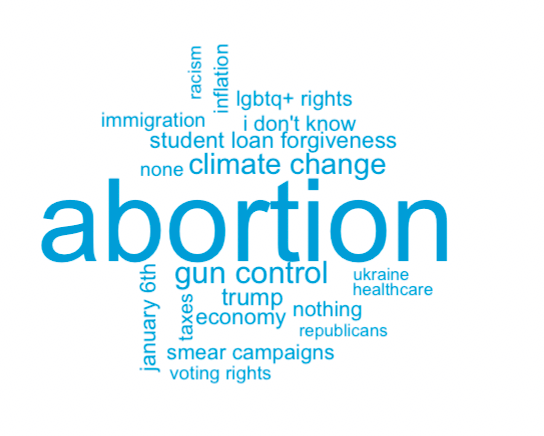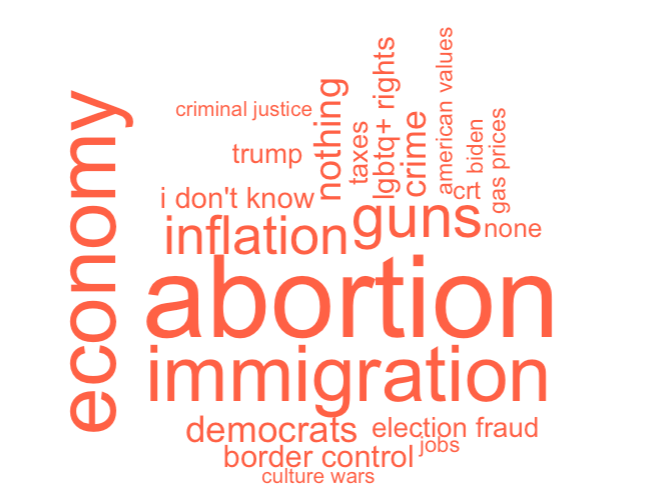On behalf of Teen Vogue, Change Research surveyed 1,173 registered voters under the age of 35 to understand how this ascendant voting bloc is thinking about the upcoming election and the issues facing the country. This survey is the second in a series of national surveys of young voters on behalf of Teen Vogue. The first fielded in the wake of the leaked Dobbs opinion in May. Change Research is proud that a diverse team of young women pollsters conducted these polls.
Young voters are motivated in the wake of Dobbs, and slightly more satisfied by some recent Democratic policy wins. However, they still are not being communicated with enough about how their votes have translated into the legislative action they support. Young voters are hungry for more progressive change and are clear-eyed about what the GOP will try to do if they win control of Congress. They are concerned about Republicans accepting the results of the election and the prospect of violent post-election clashes as the country becomes more and more polarized politically and personally. Below are the key findings.
There is evidence that young voters are more satisfied than they were both five months ago and one year ago.
Young voters are generally negative about the country, its leaders, institutions, and political parties, especially the Republican Party.
- 86% say that the country is off on the wrong track, and majorities rate negatively the state of major issue areas, like the economy (82% poor/not so good), gun control (73%), abortion rights (74%), healthcare costs (92%), and more;
- 59% disapprove of Biden’s job performance, 66% disapprove of the US House of Representatives, 68% disapprove of the US Supreme Court, and 74% disapprove of the US Senate;
- 58% are unfavorable towards the Democratic Party, and 69% are unfavorable towards the Republican Party.
With that being said, there has been a slight uptick in optimism for the future over the past five months, a period when we saw the revival of the Democratic legislative agenda in Washington. Not only has there been a 6-point improvement in the number reporting that they are optimistic about the future long-term, from 29% in May to 35% today, but also 27% report that they are more optimistic about the country compared to this time last year, including 33% of progressives and liberals and 30% of moderates. Finally, there has been a slight improvement in the President’s favorable ratings among Biden voters since May (+12 net favorable to +21 net favorable), and now 51% of Biden voters view him favorably.
The accomplishments of Biden and the Democrats in Congress are popular with young voters.
At least 6-in-10 young voters support each of the major policy achievements tested in this survey. When young voters hear about these items roughly 4-in-10 of them say that these actions count as significant steps forward (42% of the climate provisions in the IRA, 39% of the $10,000 in debt forgiveness, and 38% of the bipartisan gun safety law). The numbers are nearly the same among young Biden voters who disapprove of him.
One major Biden Administration accomplishment is student loan debt forgiveness. Not only do two-thirds of voters support this action, but 40% percent of young voters, including 52% of those paying off student loan debt, say student debt forgiveness makes them more supportive of Biden and Democrats.
We might see greater improvement in key measures if lawmakers and campaigns directly communicated these popular policies to young voters. Unfortunately, few have heard about those accomplishments.
Fewer than thirty percent have heard of the Bipartisan Safer Communities Act or the For The People Act (28% a lot/some, 24% a lot/some) and fewer than half had heard something recently about the new bipartisan infrastructure law (44%). Barely half had heard something about the Inflation Reduction Act (52%) and just 23% had heard a lot about it. Furthermore, only 53% of voters have heard a lot or some about any of the candidates for Congress in their area. The only policy changes and legislative action that most young voters are hearing, seeing, or reading about are the Supreme Court overturning Roe v. Wade (97% a lot/some) and the Biden Administration forgiving $10,000 in federal student loan debt (89%).
Abortion rights remain a top concern for young voters, especially young women, and the overturning of Roe v. Wade will have ramifications beyond just the upcoming election.
When asked what they do hear Democratic and Republican candidates talking about most during this election, abortion is the topic they hear about the most from Democrats, and abortion, the economy, and immigration are the issues they hear the most about from the Republican candidates.


Nearly all young voters have heard about the Supreme Court ruling (99%) and 9-in-10 have recently heard a lot about it. It is the number one news item tested in this poll.
Our May survey in the wake of the leaked Dobbs opinion captured the increased motivation to vote due to the attack on reproductive freedom, with 65% of young voters saying the leaked opinion made them more motivated to vote in November, and essentially the same percentage (64%) say the same today. Six-in-ten young voters say that they want to support a candidate that supports abortion rights in November.
This will not just impact voting behavior. Young people say that this will impact them and the choices they make. Overall, 62% of young voters believe the changing abortion laws in the country will impact them, with 30% saying this will impact them directly and 32% indirectly.
62% also say that they will consider a state’s abortion laws when deciding where to live in the future, as 41% currently report that they live in a state where abortion is mostly or totally illegal.
While majorities of all young voters are pro-abortion rights, there is a wide gap between young women and young men on these questions, as men have not fully become aware of how these changes will impact them and their partners.
- 76% of women say the changing abortion laws will impact them, and 48% say it will directly impact them. 54% of men say it will not impact them, and only 9% say it will directly impact them.
- A 55% majority of women are very or somewhat concerned that they will have an unintended pregnancy and not be able to access abortion care, while only 27% of men are very or somewhat concerned about their partner having an unintended pregnancy and not being able to access abortion care.
- 72% of women will consider a state’s abortion laws when deciding where to live in the future compared to 48% of men.
Young voters are clear-eyed about what the GOP offers if they gain control of Congress, and it is dramatically different from what they are demanding from candidates.
Three-quarters of young voters believe it is likely that Republicans will pass a national abortion ban, and 63% think that they will outlaw certain forms of contraception, like Plan B and IUDs. They also believe that they will undermine our elections and promote extremism by making it harder for people with whom they disagree to cast a ballot (60%), obstruct the investigations into January 6th (74%), and impeach Joe Biden (62%). Interestingly, only 41% think Republicans will make it easier for people like them to afford things, while 72% say they will likely cut taxes on corporations.
These are not the sort of values and policies that they are looking for from candidates. Young voters are most likely to support a candidate who shares progressive values and policy goals, like supporting Medicare for All (66% more likely), supporting abortion rights (64%), refusing to take corporate PAC donations (66%), and supporting legalizing recreational cannabis (67%). They are least likely to support candidates who align with the Trump orthodoxy, like identifying as a MAGA Republican (69% less likely), believing the 2020 election was stolen (66%), opposing abortion (64%), supporting a wall on the border with Mexico (59%), and saying “all lives matter” (55%).
Overall, young voters are less likely to support a candidate who supports defunding the police (47% less likely, 39% more likely). Young voters of color are more likely to support such a candidate than to oppose them (45% more likely, 39% less likely), but still fewer than half said this made them more likely to support a candidate.
Expectations about the election & views of the political system.
Young voters are worried about the legitimacy of the upcoming election and what will happen in its aftermath. Young voters are more likely to be concerned that eligible voters will be prevented from casting ballots (62%) than those who are not eligible to vote will cast ballots in the election (39%) by 23 points. In the aftermath of the election, two-thirds are worried that Republicans will refuse to accept the results of the elections if they lose while only 33% say the same about Democrats. No wonder a 59% majority also say that they are concerned that there will be another attack like January 6th in response to the next election’s outcome. Alarmingly, 56% of young voters say that another civil war is likely in America in their lifetime. Democrats (56%), pure independents (57%), and Republicans (55%) are equally likely to say this. They blame the media most for this division in the country (55%), followed by politicians themselves (39%) and social media (33%).
There is a growing divide in the dating market as well.
The number one “deal breaker” for young people when considering a partner is identifying as a MAGA Republican (63%), followed by being anti-choice (56%) and saying All Lives Matter (55%).
Partisanship is more likely to determine your “deal breakers” than gender, with a few exceptions – men of both parties are roughly as likely to say it’s a deal breaker to watch the Real Housewives, and Democratic men are more likely to resemble Republicans in saying being into astrology is a deal breaker.
The trouble is that for every two Republican men, there is only 1 Republican woman, and for every Democratic woman, there are only 0.6 Democratic men. For example:
- 84% of Democratic women say it is a deal breaker to say “All Lives Matter” while 71% of Republican men say it is a deal breaker to say “Black Lives Matter.”
- 70% of Democratic women say being conservative is a dealbreaker while 64% of Republican men say that being liberal is a deal breaker.
- 84% of Democratic women say it’s a deal breaker to be anti-choice while 42% of Republican men say being pro-choice is a deal breaker.
- 50% of Democratic women say being a devout Christian is a deal breaker while 44% of Republican men say being an atheist is a deal breaker.
This and sorting by state abortion laws may have long-term implications for marriage trends.
